15. Flaming Hearts and Imaginary Murderers
15. "Milagro", The X-Files
Click Here for the Rest of the List So Far
Season Six, Episode 18
Original Airdate: April 18, 1999
Written By: Frank Spotnitz, John Shiban, Chris Carter
Directed By: Kim Manners
Starring: Gillian Anderson as Special Agent Dana Scully
David Duchovny as Special Agent Fox Mulder
John Hawkes as Phillip Padgett
Nestor Serrano as Dr. Ken Naciamento
Synopsis: A writer living next to Mulder becomes obsessed with Scully and confesses to her that he is using her as a character in his novel. Scully finds herself strangely drawn to him, even though he is now the primary suspect in the murder case that she and Mulder are investigating.
Trivia
- The index cards that Phillip Padgett pins to his wall are covered with plot points from the T.S. Eliot poem "The Wasteland."
- The scene where Mulder runs after the hooded man in the cemetery had to be filmed on a motorcycle because David Duchovny runs so fast. According to Kim Manners, in a previous episode (Tunguska) David ran so fast that he outran two horses.
- In the cemetery, the camera seems to linger on a tombstone engraved with the names "Diana and Nicholas Salinger", which are the names of the late parents of the kids on Party of Five.
- This is Sean Penn's favorite episode of The X-Files.
- It is also one of Chris Carter's and Frank Spotnitz's favorites.
- This episode was chosen as one of eight for the DVD Revelations as one of the key episodes in the show's nine seasons.
Why It's on the List: I have been fascinated by this episode ever since it first aired, but I couldn't figure out why until I grew a brain. I first saw "Milagro" at the height of my introduction to The X-Files. In fact, it might have been the first episode I ever saw air live. At the time, my reaction and attachment to it was confined to such brilliant observations as "OMG HE JUST SAID SCULLY IS ALREADY IN LOVE WITH SOMEBODY! IT'S SO MULDER!" and "I'm going to rewind the end scene a million times because, OMG, THEY'RE TOUCHING!" But many X-Files episodes have these elements, so why is this one so important? Because it's not just about Mulder and Scully, or the creepy Monster of the Week. It's about writing and love and evil and denial, and it has typewriters in it.
Extra Goodies: Sarah Stegall's Brilliant Review, The Preview for the Episode from the Revelations DVD, Episode Transcript, Screencaps, Watch the Episode
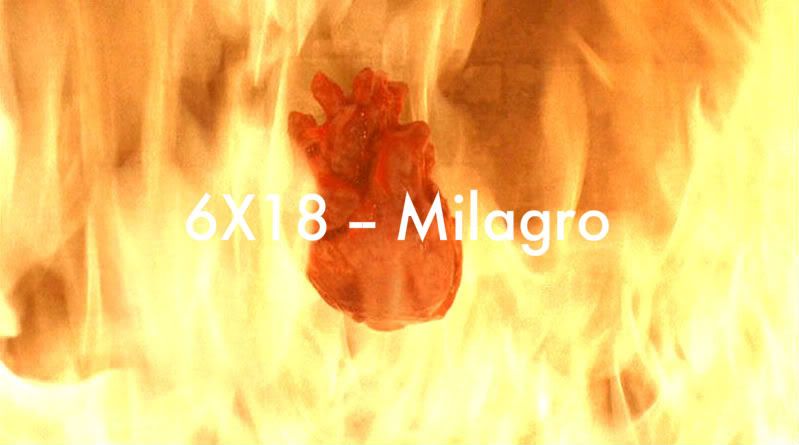
My Love is as a Fever
We open on a barren apartment, from above. Like we're a ceiling fan. A man is sitting alone at the only piece of furniture in the room, a desk with a typewriter on it. He is not typing; he is not doing anything. The camera pans down in this elliptical motion until we're at eye-level with him. The paper in the typewriter is blank; a cigarette smolders beside him. There are index cards on the walls that say things like "K.N. murders his own best intentions" and "I sat to keep off the impetuous impotent dead." Yeah, he's an emo writer-face. Oh, my pain, MY PAIN. He doesn't need furniture because he is the story, and the story is nothing but words. Cross-fading shows the passage of time; he blurs across the screen, wandering around his apartment. He drains a glass of water and uses the empty glass to listen at the wall. Who is he listening to? Cross-fade: he's sitting in his chair, swiveling. Cross-fade: he's smoking at the window at twilight. Cross-fade: he turns off the light. Cross-fade: a close-up as he lights his cigarette in the dark; the burning end of it is the only color in the room. Cut to a close-up of a toilet as he throws his cigarette butt into it. He watches himself in the mirror, closes his eyes, and the camera pans around to his profile. He opens his eyes and the camera moves. We can still see his head in the mirror, but it's blurry; the focus is on his hand as it enters his shirt. He begins fishing around in there, and blood blossoms on the pale blue fabric. The camera moves below him, like we're a small child staring up at his face. Blood drips down his hand and onto his arm, and he pulls out his still beating heart. Metaphor much? Credits.
The Uncertain Sickly Appetite
A basement. Our mysterious writer descends from above, a box in his hand, which he is presumably about to throw into the incinerator. He opens the grate, his face illuminated by the flames, and we see a heart hanging inside, pumping away surrounded by fire. The writer throws his box into the fire and leaves.
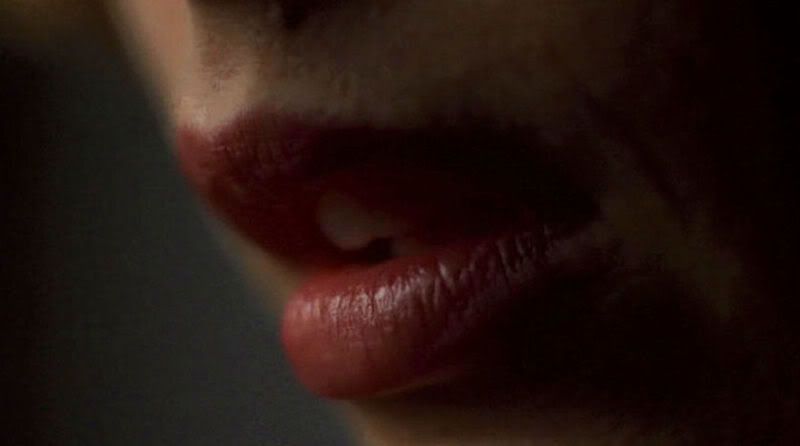
Cut to elevator doors, which open on one Agent Dana Scully, FBI. She sees the writer, and he doesn't look away; she enters the elevator. Lo and behold, we are in Mulder's apartment building. Who saw that one coming? Oh, wait, I totally did. Knew the whole time. The writer just keeps staring at her as she enters the elevator, she looks at him and he doesn't blink and at first she's kind of amused but then it's just awkward. He is just OGLING her. The camera lingers on an extreme close-up of luscious red Scully lips. If we didn't know it before, we totally do now: this guy is a total perv. He is practically salivating in fascination. We know that he is staring at her eyes because the camera goes in for another close-up. We can still see enough of her face to see that she knows it; she can't wait to get off of that elevator.
She gets off warily on the fourth floor and sees that he seems to be following her. She knocks on Mulder's door and looks over at the writer, who is still fucking staring at her. The creepiest part is that he doesn't even care that she knows. Mulder finally answers the door, brushing his teeth.
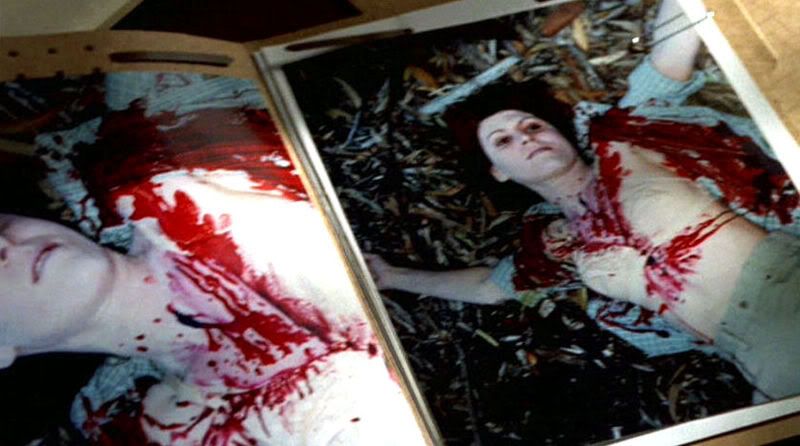
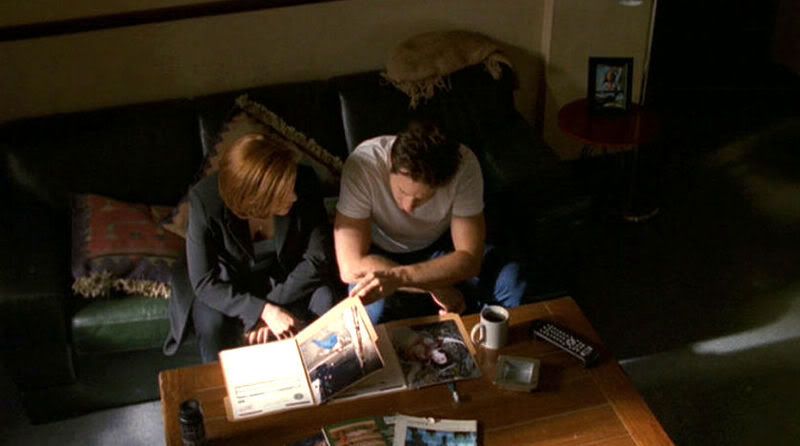
Inside, she tells Mulder about riding up on the elevator with his neighbor, casually grilling him for facts. They sit down on the couch and she shows him her autopsy reports from the second victim of the case they're working on. Next door, the "young guy," as Mulder calls him, is listening in. He is standing on his chair, his ear to the ventilation shaft. We see an overhead shot of Mulder and Scully, as if the writer is watching them and not just listening. Mulder and Scully look nice together, don't they? We cut back and forth from Mulder and Scully to the writer's view of them. Scully tells Mulder that the victim's heart has been removed but she couldn't find any marks whatsoever on the body to indicate how it was done. Additionally, there is no forensic evidence: no DNA, fingerprints, hairs or fibers. Mulder: "And yet you still refuse to believe my theory -- that what this is, is psychic surgery?" Oh, Mulder, your mole is so cute. And your lips. But Scully battles on: "Mulder, psychic surgery is some man dipping his hand in a bucket of chicken guts and pretending to remove tumors from the sick and gullible." Let's just agree to disagree, shall we? Or, actually, then there would be no show. They banter some more about how this could have happened, but Mulder finally admits -- creepy writer stalker guy listening in -- that this could be the perfect crime. The writer is practically salivating listening to this conversation. Scully: "Well, a crime is only as perfect as the man or the mind that commits it. Even if it were perfect-- even if he made not one mistake-- there's still his motive. You find his motive and you find the murderer." And the writer, looking concerned, gets down off of his chair. It's interesting that we enter this episode in the middle of the X-File -- and this is the only time that happens in the whole show, I believe -- and what that tells me is that it's not about the murders. It's about something else.
Later that night, the writer is puffing on his cigarette. He's lying naked in his bed, blowing smoke rings, and probably thinking about death. Or banging Scully. Either one. His strangely muscled chest and goatee really creep me out. He gets up out of bed, presumably heading to his typewriter. Cut to a car parked in the woods overlooking the city. A girl named Maggie and a boy named Kevin are sitting in the car, arguing about, you know, going too far. Maggie's all Miss Lectureface, like, I told you we shouldn't have come here because all you want to do is get in my pants! And Kevin's all, but there's totally this console in between us. And then we're outside the car looking in at them through the windshield and all we can hear are mumbles. Meanwhile, through the back windshield, we see a hooded figure emerge from the trees and the camera instantly focuses on him, putting Maggie and Kevin out of focus in the foreground. Back in the car, Kevin goes in for the kill, and when he uses too much tongue, she pulls away again: "There you go again." Kevin: "What?" Maggie: "That thing you do, you know what I am talking about." He tries to calm her down, but she's so upset she has to leave the car. After a wait of a few seconds, he follows her. Maggie is standing alone by a tree as Kevin searches for her, calling her name, and she moves to avoid him. He sees some ruffling in the bushes and thinks it's Maggie, but our hooded friend comes barreling out instead, chases Kevin down, and pins him to the ground. We hear squishing sounds, and Kevin screams a lot. The camera zooms in as the hooded killer raises the still beating heart high in the air, and Kevin is still alive enough to scream, to see it steaming in the cold. Cut back to the writer. He types, in extreme close-up on the keyboard, "beating heart." His eyes twitch and his brow is sweaty. Is he writing these murders? The fuck is going on? He pulls the sheet of paper out of the typewriter and puts it in his ever-growing stack.
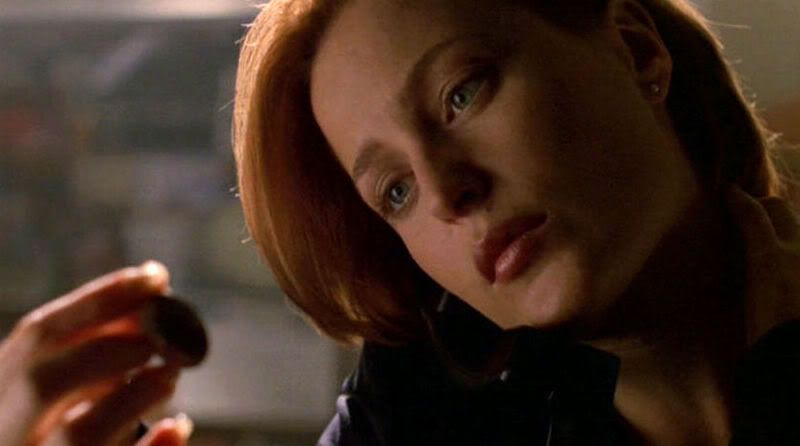
7:07 AM: FBI Headquarters, Washington D.C. A phone is ringing in Mulder and Scully's basement office; the camera is positioned on the floor and we see Scully walk in with her power-heels to pick it up, trodding over a small white envelope. It's Mulder on the phone and he tells her about Kevin, their third victim. Cut to Mulder at the crime scene, standing over Kevin's pale and bloody body. Scully wants confirmation, but Mulder's positive: "I'm sure many a person has had their heart broken out here, but not quite like this." Our two beautiful agents are flummoxed; Mulder tells Scully he was hoping she'd be there to explain in medical detail to the local police, but she's says she's not sure she could. There is nowhere to start on this case. Just as Scully is suggesting they investigate the pattern of his victims, why he chooses them, she spots the envelope and goes to pick it up, carrying the cute little corded office phone with her. She tells him that an envelope has been slipped under his door (your door, too, Scully!), and rips it open, finding a tiny charm inside emblazoned with the image of a hand holding a flaming heart. The sound cuts away to a monologue from the writer, and the camera starts a slow pan around Scully. He savors each word, each sound is a seduction:
"Her prompt mind ran through the golconda of possibilities-- was this trinket from the killer? Was there a message contained in its equivocal symbolism? Was he a religious fanatic who had, in fervid haste licked the envelope, leaving the telltale DNA that would begin his unraveling? She had a condign certainty the killer was a male . . . and now, as she held the cold metal at her fingertips she imagined him doing the same trying to picture his face."
Her lips remain open and she gazes surreally at the tiny pendant. Cut to the writer, pecking away at his keyboard, lost in his perverted fantasies:
"It would be a plain face, an average face . . . A face people would be prone to trust. She knew this inherently, being naturally trusting herself. But the image she conjured up was no better than the useless sketch composites that littered her files. Preconsciously, she knew this wasn't her strength as an investigator. She was a marshall of cold facts, quick to organize, connect, shuffle, reorder and synthesize their relative hard values into discreet categories. Imprecision would only invite sexist criticism that she was soft, malleable not up to her male counterparts."
The camera pans around him in the same direction it was doing to Scully earlier; there is a connection there. Cut back to Scully, the slow pan continues, and with the writer's words, she pushes her hair slowly behind her ears, her hands lingering delicately on her face. She is still apparently listening to Mulder, but her thoughts are elsewhere. This is some creepy shit:
"Even now, as she pushed an errant strand of titian hair behind her ear she worried her partner would know instinctively what she could only guess. To be thought of as simply a beautiful woman was bridling, unthinkable. But she was beautiful . . . fatally, stunningly prepossessing. Yet the compensatory respect she commanded only deepened the yearnings of her heart . . . to let it open, to let someone in."
Is he right, is this what she's thinking? It's creepier if it's true, also more interesting. I've got a thousand bucks that says our writer thinks it's gonna be him that she wants to let in.
Reason, The Physician to My Love
The X-Files office, later. We open on Mulder's fingers holding the charm, as Scully tells him it's a milagro, "That's the Spanish word for 'miracle.' It's worn as a lucky charm." Mulder wants to know if it came here for him, and Scully says: "It was dropped off at reception by a man in his late 20s, early 30s . . . average looking, average build. They weren't able to get a good ID. There are no fingerprints and no DNA from his saliva." He flips it casually into the air and tells her he doesn't think it's for him, that even though it's a burning heart, they're dealing with a killer who leaves no clues. "Why would he do something as heavy-handed as this?" Scully suggests that he's taunting Mulder, but Mulder has another idea: "Maybe it's not me at all. Maybe he sent it to you. Maybe it's a secret admirer." Scully sighs in partial disgust at Mulder's patronizing tone and tells him she's going to check it out anyway, but Mulder tells her that she has an appointment to autopsy the latest victim. She just stares at him, and then: "Thank you for making my schedule but I think I'm going to have to be late for that appointment." Whenever Scully remembers that she's a woman, she always gives Mulder a hard time about controlling her life. Maybe if he would just learn his lesson and do her already, this wouldn't be a problem. His "What did I do?" face says it all.
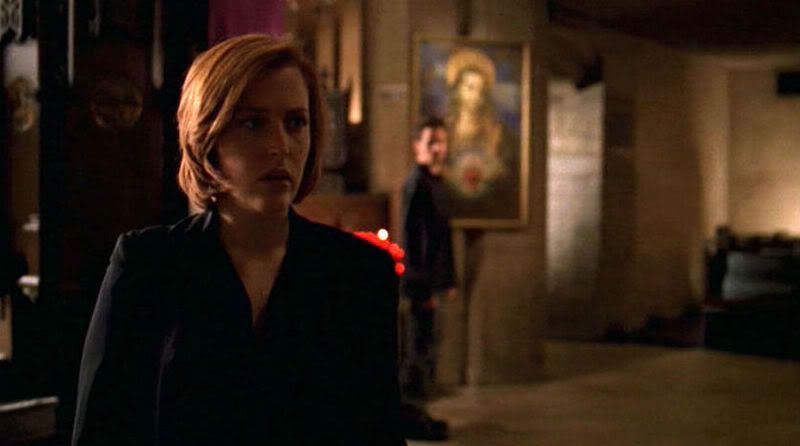
Scully enters a Catholic church and heads determinedly for a painting at its front corner. The camera watches her from behind a column. She reaches the painting -- it's of Christ holding a flaming heart -- and the camera pans around to find the writer standing next to her. She is visibly shaken, but he seems to take no notice, instead choosing to basically confess that he's the murderer, the asswipe.
"I often come here to look at this painting. It's called 'My Divine Heart' after the miracle of Saint Margaret Mary. Do you know the story . . . the revelation of the Sacred Heart? Christ came to Margaret Mary his heart so inflamed with love that it was no longer able to contain its burning flames of charity. Margaret Mary . . . so filled with divine love herself, asked the Lord to take her heart . . . and so he did placing it alongside his until it burned with the flames of his passion. Then he restored it to Margaret Mary sealing her wound with the touch of his blessed hand."
Scully is held by the power of his words, all the while wanting to run for the hills. And it only gets worse, as he tells her that he knows she came here to see the painting because she knew right where it was. Scully: "You live next to somebody I work with. Why are you following me?" Writer: "I'm not. I'd only imagined that you'd come here today." No doubt he believes that his heart, too, flames with passion, and that one day hers will, too. And then it's stalker extreme:
"I'm a writer. That's what I do -- imagine how people behave. I have to admit I've noticed you. I do that . . . Notice people. I saw that you wear a gold cross around your neck so I was taking a chance with the painting -- explaining something you may have already known. I saw Georgetown parking permits on your car dating from 1993 and a government-exempt sticker that lets you park anywhere you like. You don't live in this area but as a federal employee, you have reason to frequent it. You're fit, with muscular calves so you must exercise or run. There's a popular running route right nearby that you might use at lunch or after work. You'd have noticed this church in passing and though parking is always a problem in this part of town your special privileges would make it easy to visit … not as a place of worship but because you have an appreciation for architecture and the arts . . . and while the grandeur is what you'd take away from your visit … this painting's religious symbolism would have left a subconscious impression jogged by the gift you received this morning."
He says all of this with such monotone, calm certainty that the effect is only heightened. Scully is majorly weirded out, because he's right about everything, and when he tells her he gave her the milagro, and that he has a "secret attraction" for her, she rolls her eyes, unable to deal with it. He apologizes for not leaving a note explaining his gift, but she didn't know him yet -- she retorts that she doesn't care to -- he apologizes for making her uncomfortable. "It's just that I'm taken with you. That never happens to me." There are tears in Scully's eyes, and she walks away, and this is just a fabulous scene.
The morgue. Scully walks in and Mulder tells her he was worried about her; he didn't think she'd be this late. She says that she owes him an apology, that the milagro charm is insignificant after all. But, in typical Mulder fashion, he interrupts her and tells her she's wrong again -- that it may be a communication from the killer. "Most of my research shows that most credible practitioners of psychic surgery believe themselves to be imbued with the Holy Spirit-- that their hands become the miracle tools of God." Scully smirks in amusement. She holds up the charm: "Mulder, this . . . is nothing more than a tool used by a lovelorn Romeo who just happens to be your next-door neighbor." Mulder's like, fu-wha? "The writer?" Yes, Mulder, the writer who cornered your pretty partner, claiming to know "the mysteries of her heart" and telling her her life story. "It was kind of frightening, actually." Mulder is obviously torn: between his aggressive need to protect his tiny partner, and the disbelief that someone would actually notice her. David Duchovny does a nice job with Mulder's subtle facial expressions in this scene. He just can't believe it. In the end, he remembers to think like a cop, and asks if the writer is the killer. Scully doesn't think so: "'Frightening,' as in too much information and intimate detail. What kills you is his audacity." But Mulder needs a name, and when Scully doesn't know it, he just nods, unsure what to say.
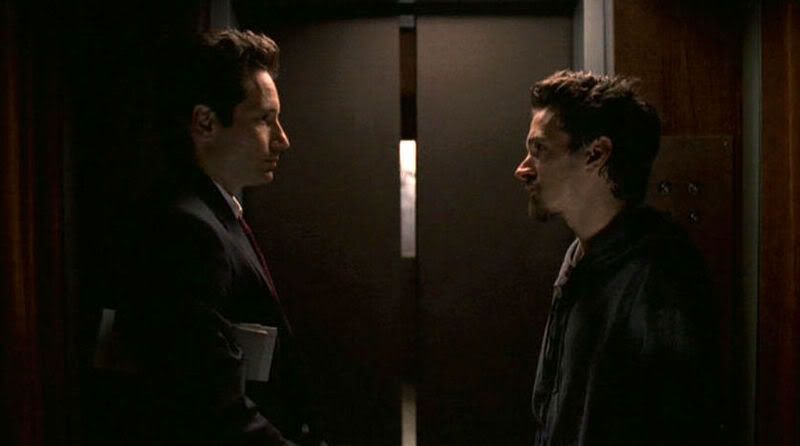
The lobby of Mulder's apartment building. Mulder is examining the mailbox, looking for his neighbor's box. He looks around to make sure no one's watching, pulls out some sort of tool, and picks the postmaster's lock. He gets in and pulls the whole mailbox open, taking out his neighbor's mail. He locates a phone bill and puts the rest back -- the writer's name is Phillip Padgett. He picks up a free copy of the DC Muse from the floor and hides the phone bill inside it. Just in time, too, as in walks Padgett. Mulder and Padgett enter the elevator and begin their awkward ride. Mulder smiles at Padgett, trying to act nonchalant, but Padgett immediately glances at the mail tucked in Mulder's arm and doesn't smile back. Mulder pretends to have forgotten Padgett's name and then starts talking to him about his writing. "Anything I'd know?" "I don't think so." Padgett's gaze is openly hostile; the elevator dings open and they both head for their apartments. Padgett: "You're an FBI agent. Working on anything interesting?" Mulder: "A murder case." Padgett: "Anything I'd know?" Mulder: "Possibly." He's on to you, buddy.
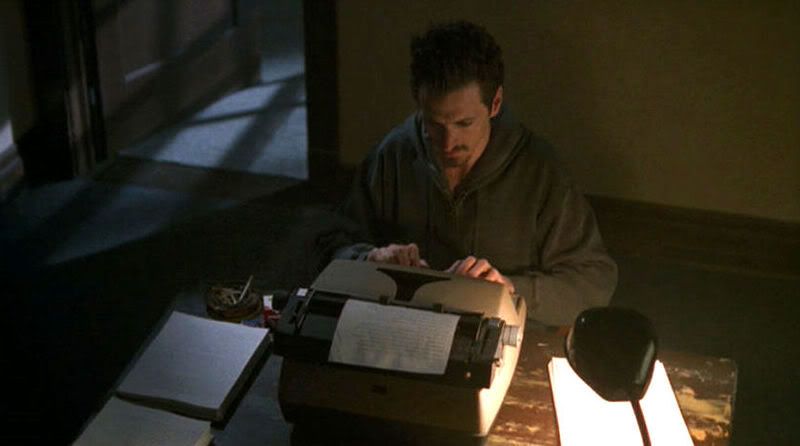
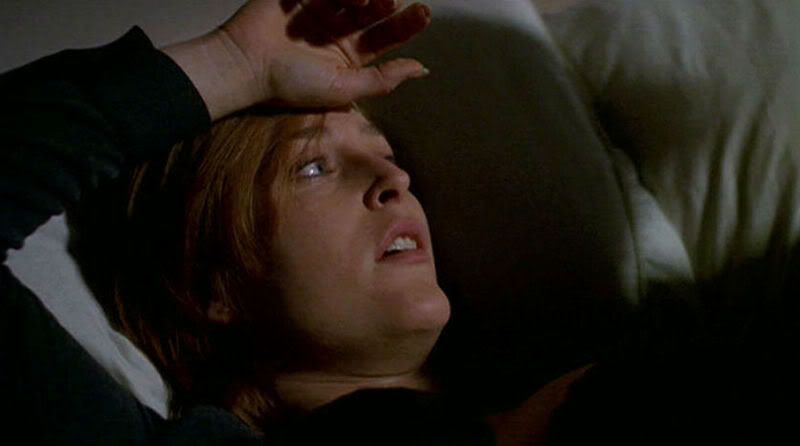
Padgett is typing in his apartment, and his voiceover speaks: "The overture in the church had urged the beautiful agent's partner into an act of Hegelian self-justification. Expeditiously violating the fourth amendment against mail theft, he prepared to impudently infract the first." He looks up toward the grate, where on the other side of the wall, Mulder is listening to him type. The voiceover continues: "But if she'd predictably aroused her sly partner's suspicions Special Agent Dana Scully had herself become . . . simply aroused." Cut to Scully in the morgue, finishing up the autopsy. She pulls off her bloody gloves and apron, to an even creepier voiceover than before, if that's even possible. She takes out the milagro and we listen:
"All morning the stranger's unsolicited compliments had played on the dampened strings of her instrument until the middle 'C' of consciousness was struck square and resonant. She was flattered. His words had presented her a pretty picture of herself quite unlike the practiced mask of uprightness that mirrored back to her from the medical examiners and the investigators and all the lawmen who dared no such utterances. She felt an involuntary flush and rebuked herself for the girlish indulgence."
A sharp cut to Scully's imagination: she's on a bed in a bare apartment, kissing a dark and dirty stranger in a blue shirt, a shirt we've seen before. He runs his hand up her thigh and unbuttons her shirt. She is breathless and slutty, and it kind of makes me want to vom, this rebellion from Mulder. Because that's what this is; just look at the last line:
"But the images came perforce and she let them play -- let them flood in like savory -- or more a sugary confection -- from her adolescence when her senses were new and ungoverned by fear and self-denial. 'Ache,' 'pang,' 'prick,' 'twinge' -- how ironic the Victorian vocabulary of behavioral pathology now so perfectly described the palpations of her own desire. The stranger had looked her in the eye and knew her more completely than she knew herself. She felt wild, feral, guilty as a criminal. Had the stranger unleashed in her what was already there or only helped her discover a landscape she, by necessity, blinded herself to? What would her partner think of her?"
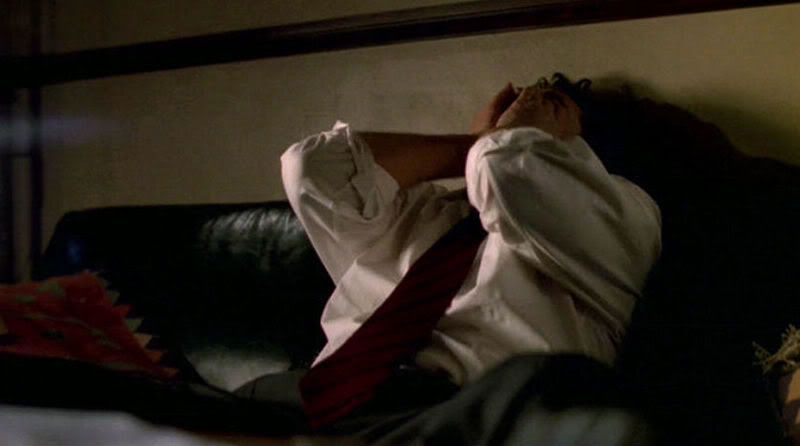
Mulder is just sitting on his couch, watching the grate and listening to they typing. He moves to open the phone bill, but there are no charges. "Mr. Popularity." He leans back and covers his eyes in frustration -- this is going nowhere, and methinks he's more than a little bit jealous, although he probably doesn't even know it, the idiot. Most likely out of boredom, he picks up the DC Muse and begins to read.
Out in the hall, Scully exits the elevator and heads for Mulder's door. She's about to knock when she hears Padgett typing -- we see him type in close-up: "the compulsion was overwhelming." There is a soft knock on his door. It's Scully, and she holds out the milagro to him. "I was going next door and I thought that I'd return this." Creeper's just like, "Why?" Um, because you're an oily greaseball? But Scully's nicer than me: "Because I can't return the gesture . . . I can't." Padgett seems unfazed, even confident: "You're curious about me." She doesn't affirm, but changes the subject to his nonexistent furniture. He says he has what he needs: "I live in my head." Segue into his writings, and Scully asks the same question Mulder did: "Anything I'd know?" But Padgett says, "No, they're all failures," . . . except the one he's writing now. Scully keeps questioning him, and when catches her at it, she professes that he leads a curious life. Padgett: "It's not so different from yours I imagine -- lonely." Scully, somewhat offended: "Loneliness is a choice." He ignores her again, and instead invites her in for coffee. Inexplicably, she accepts.
Back in Mulder's apartment, we see Mulder has found a personal ad in the Muse that reads: "TO MAGGIE WITH LOVE, On Valentines Day, 2/14/99, Kevin." Mulder has circled it. He brings in a whole stack of newspapers from the other room and gets down to business.
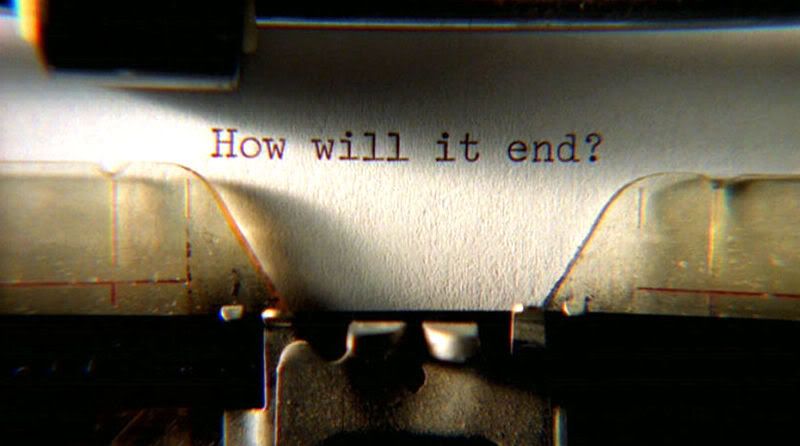
Meanwhile, back in the den of iniquity, Scully is exploring what little there is of Padgett's apartment. She sees the words "How will it end?" on his typewriter as he enters with two cups of coffee. She tells him that her life isn't so lonely -- anything but -- and how is it that he thinks he knows her so well? "I'm writing about you." Right, then. She just stares at him, but when he doesn't blink, she's all, the fuck? You were serious? "Since when?" "Since I first noticed you. You live in my old neighborhood." Scully puts the pieces together: "And you moved into this building by coincidence?" Nope. Padgett: "There wasn't anything available in your building and it's not like you spent a lot of time at home. I should've said something but I just couldn't get it all down fast enough. To really write someone, I have to be in their head. I have to know them more completely than they know themselves." Scully wants to know if she can read it, but it's not finished. He invites her to sit and stay a minute, but there are like, no chairs. He leads her into the bedroom and tries to turn the lamp on. She looks even more uncomfortable than before; she tells him she's due next door. Scully: "I'm very uncomfortable with this." "Why, you're armed, aren't you?" The light turns on for a second, but then blows out. "Imagine that." He goes to get a bulb, and Scully looks uncomfortable some more. When he returns she asks him: "If you know me so well then why am I standing here when my instincts tell me to go?" He tells her that motive is never easy, and she sits. Behind them, the light blows out again, and Padgett says: "Imagine that," again. They are awkward some more, or rather, Padgett is creepy and sexual and Scully is acting like a weirdo. And then, thank Jesus, Mulder busts in the door, gun drawn. He's surprised to find them in the bedroom, then quickly recovers and asks her if she's all right. She's a little confused about his behavior, especially when he starts ripping through Padgett's manuscript, finally pulling out one of the pages. She asks Mulder what he's doing and he hands her the page in response. On the page, Scully sees the words: "…his fantasy come to life…," "… and felt his warm, beating heart." Mulder places Padgett in handcuffs as Scully contemplates what might have been, horror written all over her face.
For I Have Sworn Thee Fair, and Thought Thee Bright
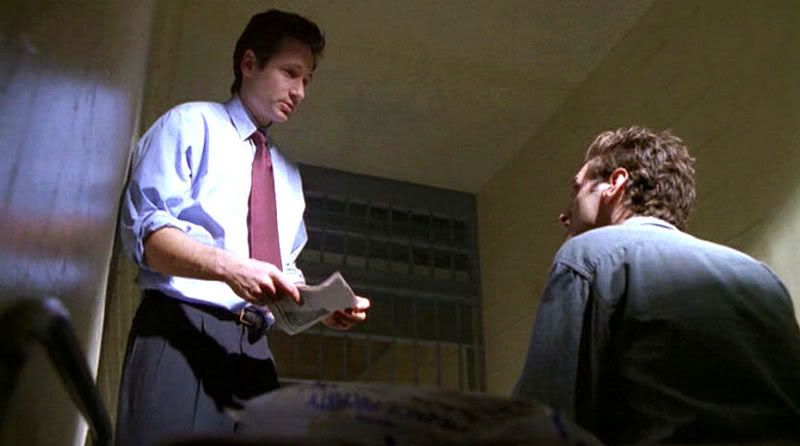
Padgett's cell, the next morning. Mulder has Padgett confirm that he's seen the DC Muse, and expounds on his theory that Padgett finds his victims through the personals. Padgett admits that he read their names, "They were lovers." Mulder: "You targeted them." Padgett denies being a murderer: "I only write about them." Scully interrupts, citing Padgett's need for a lawyer, but Padgett says he doesn't need one: "I'm telling the truth." Mulder throws Padgett's bagged manuscript into his lap: "Is this your confession?" Every murder is in there; every detail. When Mulder presses him he says, "I only knew what was in my mind and wished to express it clearly." Mulder asks him about The Stranger, "Is that you?", and about Ken Naciamento, "the self proclaimed Brazilian psychic surgeon." Mulder wants to know if Naciamento is his accomplice, but Padgett is cagey: "I guess you could say that. He's a central character." Mulder keeps pushing, trying to get him to admit to directing Naciamento to kill these people. Padgett: "Jungians would say it's the characters who choose the writer, not the other way around. So I guess you could argue he directed me." Mulder glances at Scully, and Padgett babbles about words and signs, making Mulder angry. When Mulder moves aggressively towards Padgett, most likely to punch him in the face, Scully intercepts, placing her hand gently on Mulder's arm. Padgett's face in this moment, when he sees them interact, is wonderful. I love this moment; it's a slap in the face. He just stares, even as Mulder asks him "Why?" But that's the one question he can't answer; he doesn't know why he does it. Just as the agents are leaving, Padgett calls out to Mulder, asking if he liked the book. Mulder: "Maybe if it were fiction."
Scully follows Mulder out into the hallway and asks him where he's going. Mulder says he's going to find the accomplice, but Scully's already on that shit. "I did that. That's what I've been doing. Dr. Ken Naciamento, Sao Paulo, Brazil, emigrated here in 1996." And where is he now? "Dead." She shows him a picture of our hooded killer -- dramatic irony! -- but Mulder doesn't believe it. Scully: "Two years dead, Mulder. I'm having them fax me a certificate of death." Mulder says that Padgett couldn't have done this alone, and Scully suggests -- gasp! -- that maybe he didn't do it at all. They argue some more about predicting human behavior and imagining the human mind. Mulder: "If he imagines it, it's a priori -- before the fact. I think that's pretty clear from what he wrote about you." Scully just stares at him, and Mulder prompts her further: "You know you're in here, don't you?" She admits she read a chapter, but what else does he say? Mulder leans in a little closer and says, "Well, let's just say it ends with you doing the naked pretzel with "the stranger" on a bed in an unfurnished fourth floor apartment. " She doesn't know what to say, and he continues: "I'm assuming that's a priori, too?" She scoffs a little: "I think you know me better than that, Mulder." He looks at her, kind of sad, kind of territorial -- she's almost as upset now as she was in the church with Padgett. He hands the her the manuscript and tells her she might want to finish it, and then he walks away. Meanwhile, all this time they've been talking, you can see this vague outline of Padgett in his cell in the background. Very nice touch.
Later, Scully is reading the manuscript in an interrogation room. She is quietly turning each page with this horrified fascination; she is almost out of breath. A guard interrupts her, saying that the prisoner has written something the guard thinks she should see. Scully is curious; she takes it. "He says it's a statement. I think he's putting somebody on." He leaves, and Scully-voiceover reads to us from the legal tablet: "Grief squeezed at her eggshell heart like it might break into a thousand pieces its contents running like broken promises into the hollow places his love used to fill." Cut to a graveyard at night, Scully's voiceover continues as we see someone standing by a fresh grave:
"How could she know this pain would end? That love, unlike matter or energy, was in endless supply in the universe . . . A germ which grows from nothingness which cannot be eradicated even from the darkest of hearts. If she had known this -- and who could say she would believe it? -- She would not have chanced to remain at his sad grave until such an hour so that she might not have to learn the second truth before the first: that to have love was to carry a vessel that could be lost or stolen, or worse, spilled blood-red on the ground. And that love was not immutable and could become hate, as day becomes night, as life becomes death."
It's Maggie, and she is weeping. Off in the distance she sees a hooded figure coming towards her. Its is Ken Naciamento, the seemingly dead Brazilian psychic surgeon. Just as Scully's voiceover is ending, he begins to chase her and tackles her to the ground. He grits his teeth in determination as he rips out her heart with his bare hands, and she just keeps screaming. Back in the interrogation room, Scully knows what has happened. There's been another victim.
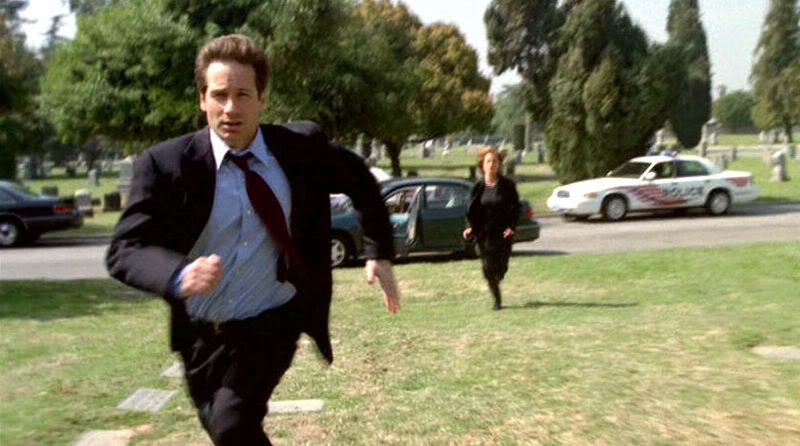
The graveyard, the next morning. The place is crawling with cops, and Mulder is wearing sunglasses. He approaches Scully, who is just hanging up her cell phone, and tells him that Maggie is a no-show at work or anywhere else she might go. Mulder says there's no evidence of a struggle because of the trampling done by the funeral; thinks this is just a big "jerk-off." Scully attempts to suggest Padgett's innocence once again, when Mulder is distracted a truck carrying all the dead flowers people leave on graves, and by the man driving it, who is wearing a hood. He pulls out his gun and runs toward the man at an incredibly fast pace, tackling him like a linebacker. Mulder pulls back his hood, and it's just a young guy who works at the cemetery. Scully is bemused, but Mulder tells her to check the truck. When she kind of refuses, he does it himself, and buried beneath the wilting flowers he finds Maggie, dead and bloody.
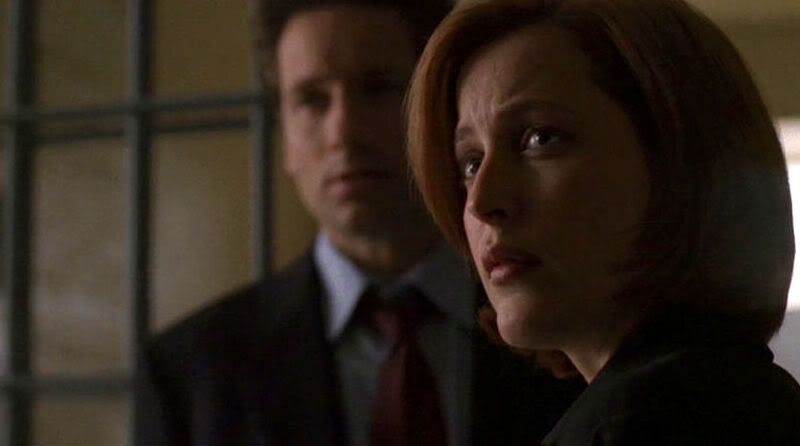
Mulder and Scully enter the jail where Padgett is being held. Scully wants to know how Mulder knew the body was in the truck, and he replies with his hand mockingly on his brow, the smart-ass: "I imagined it." But Scully's not convinced that there is any evidence that Padgett directed the killer. Mulder: "What do you need, a signed work order? Of course he directed him." Scully angrily and quietly tells him that he's making assumptions without facts, "What about time of death? What --" He grabs Scully's shoulders and turns them both 180 degrees, so that they have switched places. Scully's like, the fuck? Mulder: "You're about to argue my usual side, aren't you?" Mulder would probably find this more amusing if he wasn't feeling so possessive and angry. He doesn't understand how Padgett has gotten to Scully. "Mulder, why couldn't he have imagined it? Why couldn't he just be in the killer's head?" Mulder: "You read his book. You read what he wrote about you. Are you trying to tell me that he got inside your head? That what I read is true?" She looks away, and lies: "Mulder, of course not." If she were to tell him the truth right now, he would believe her and the case would turn around. But she can't tell him the truth because she cares too much about what he thinks of her. Besides, this isn't really there story to figure out, to be the heroes: it's Padgett's. Mulder turns toward Padgett's cell, telling Scully that he doesn't know how they communicate, but this is the only way he knows how to catch him. This, being letting Padgett go. He opens the cell, and apologetically hands over the plastic-wrapped manuscript, telling him he can go. He thanks them walks out of his cell, but before he leaves completely, he stops and with his back to them says, "I made a mistake myself." When Mulder asks him what that mistake was, Padgett turns around, Scully looking at the floor: "In my book, I'd written that Agent Scully falls in love but that's obviously impossible." He looks at Scully and then back at Mulder, who nods his head, like, why? Padgett: "Agent Scully is already in love." He walks away and the camera does a slow zoom on Scully, and we see Mulder in the background. Their expressions are unreadable; it is a fantastic moment.
Who Art as Black as Hell, as Dark as Night
Padgett enters his apartment and takes his shoes off. The music is a heartbeat. He takes his manuscript out of its plastic casing, searching for the part that he must now re-write. Just as he is about to rip up his ending, he starts; there is a man in the doorway. It's Naciamento, hooded as usual. He is horrified: "What are you doing here?" Naciamento just stares.
Naciamento approaches slowly, like death, if death spoke with a gravelly Brazilian accent: "You seem surprised to see me." Padgett is FREAKED OUT: "Yes, completely." Naciamento wants to know why, "I'm your character." Padgett asks him what he wants, and Naciamento says he's here to help Padgett finish; Padgett says he can't figure out Naciamento's motive; he stutters for the first time, unsure of himself. Naciamento: "You imagine me so perfectly in every way. So perfectly that you bring me to life. Why did you choose me?" Padgett: "I needed a perfect crime. And she's a doctor. She'd be horrified by what you do." Naciamento, with the creepiest, gravelliest line-read ever: "I'm horrified." He moves in closer. "I just want to know why I do it." Padgett, creepy: "So I could meet her." Naciamento moves in even closer: "That's not a reason. It's an excuse."
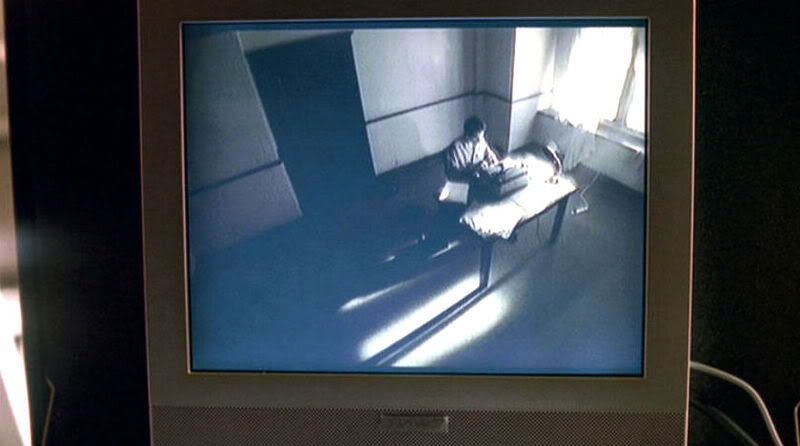
Next door, Mulder and Scully have set up a surveillance camera through the ventilation grate. All Mulder and Scully see is Padgett, "Just sitting there. Staring." Immediately we cut to Naciamento -- who is apparently in Padgett's head -- taking a piece of paper from Padgett's hand. It's the ending, and he explains to Naciamento that he misjudged Scully's interest in him: "She's only trying to get his attention but doesn't know it." Naciamento scoffs when Padgett says he wanted to love her: "No wonder you can't finish this book, Padgett. Why do I want their hearts?" But Padgett doesn't know -- he wants Naciamento to tell him: "I'm your character. You tell me. My reason is your reason." Padgett says he wants to feel love. Naciamento, fervent and scary: "No. No. You had it right up to there. You were a tool of the truth. And when it finally arrives -- when I arrive -- you don't want to see it." But what is the truth? "Man imagines that he, too, can open up his heart and expose the burning passion -- the flames of charity -- like the creator himself but this is not in his power." Padgett: "But I have love in my heart." Naciamento tells him, yes, "as a thief has riches, a usurer money. You have it . . . but man's only power, only true power, is to destroy it." Then what's the ending of his story? "There can only be one true ending if it is to be perfect." Padgett pauses, almost unwilling to say it: "She dies?" Padgett: "See? It almost writes itself."
Next door, Scully is laying back on Mulder's couch, her boots removed, when Padgett starts typing. Mulder comes in from the kitchen carrying a glass of water and asks Scully what he's up to now. He takes a sip as she puts the head phones up to her ear: "He just started typing again." He pulls it out of the typewriter, puts it at the end of his stack and walks out of the room. Mulder gets up to move the camera, but it appears he's left the apartment when they hear a door slam. Mulder runs out of the door just in time to see the elevators closing; he runs for the stairs. In the basement, Padgett opens the incinerator. Mulder enters the basement, his gun drawn, telling Padgett to step away from the incinerator in which he was about to toss his manuscript.
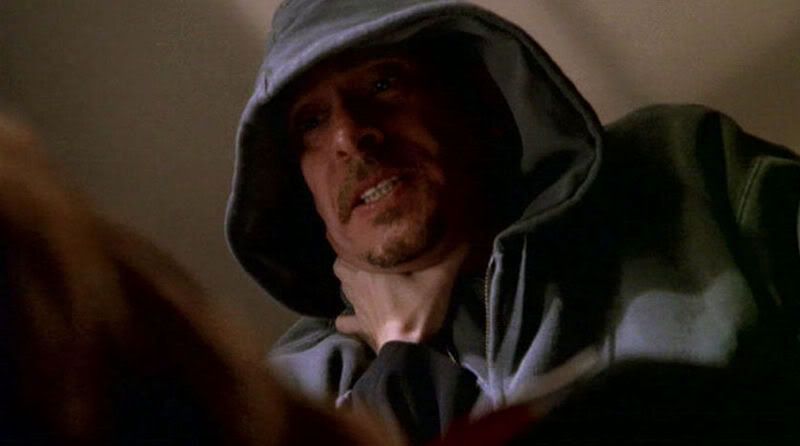
Back in Mulder's apartment, Scully has hurriedly put her boots back on, and when she opens the door Naciamento is standing there. He pushes her violently back inside. In the basement, Mulder asks Padgett what he's doing. Padgett says he's destroying his book. Mulder: "Destroying evidence, you mean." He advances on Padgett and demands to see what he's written, but Padgett says he'll tell him. "He kills her." Up in Mulder's apartment, Naciamento has Scully pinned to floor and is attempting to remove her heart. She screams and blood flecks blossom on her white shirt. She tries to go for her gun. Back in the basement, Mulder is examining the last page of the manuscript and asks Padgett whether he came down here "to give these instructions to your accomplice," but Padgett says,"No, he told me how it ends." Mulder wants to know when, Padgett was alone up there. Both men hear gunshots coming from upstairs, and we cut to Scully, who has fired six rounds into Naciamento with no effect. Mulder turns and runs up the stairs.

Padgett quickly picks up the pieces of his manuscript and tosses them into the fire, just as Scully runs out of bullets. The manuscript blackens and curls in the fire. Mulder runs down his hallway, panicked.
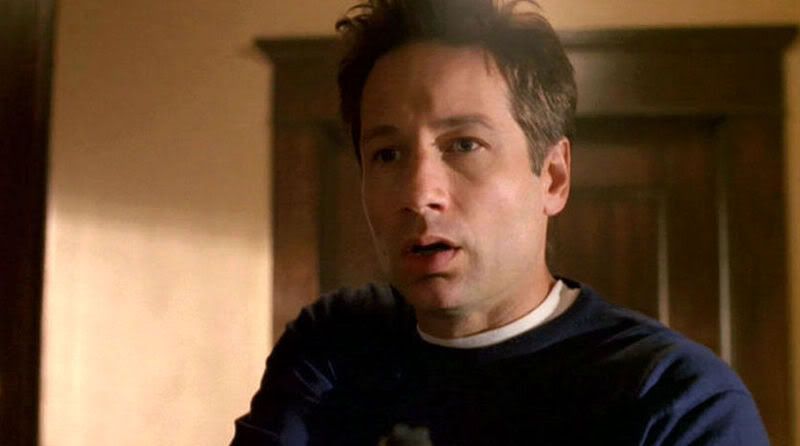
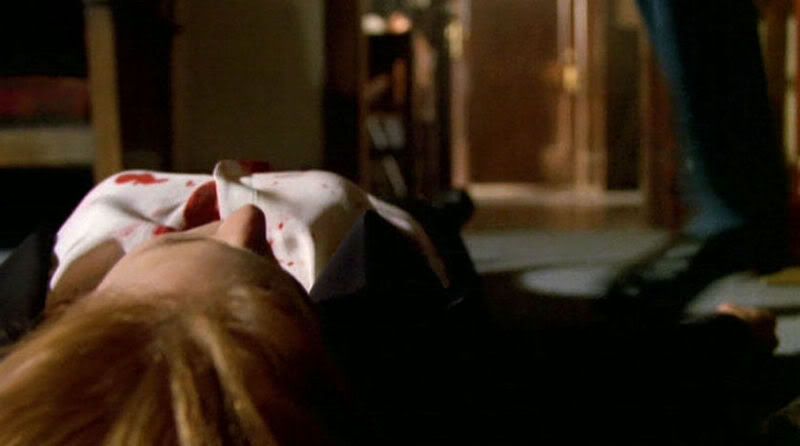
He kicks open the door and finds Scully unconscious -- and seemingly dead -- on the floor. Her neck is covered in fresh blood, and Mulder is afraid to touch her. How many times must he lose her before he realizes? Suddenly, she starts awake and grabs for him. He catches her in his arms and holds her tight.
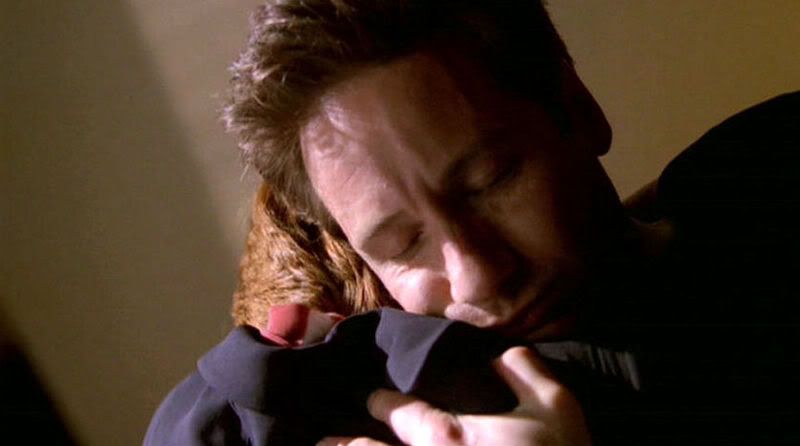
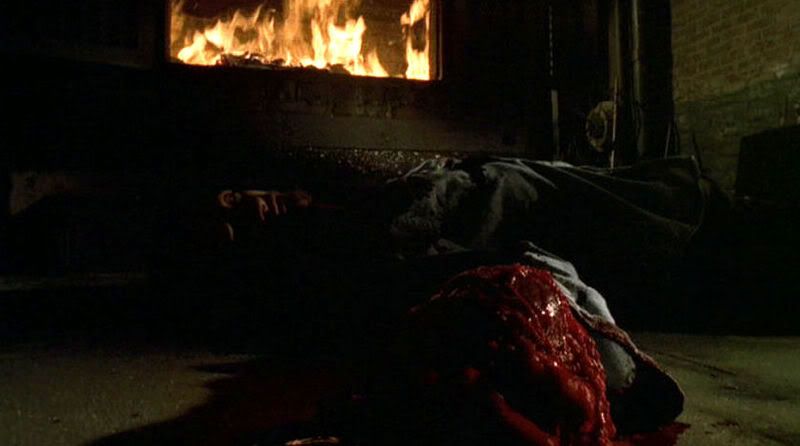
Relief washes over his face as she clutches his back, starts to sob. He holds her tighter, and closes his eyes. Down in the basement, the manuscript is consumed, and Padgett's voice narrates as we see the camera zoom out on his last burning act of passionate sacrifice. He lies on the floor, dead, holding his own heart:
"A story can have only one true ending. Even as the stranger felt compelled to commit his final words to paper, he did it knowing they must never be read. To see the sum of his work was to see inside his own emptiness: the heart of a destroyer not a creator. And yet, reflected back upon him at last he could see his own ending -- and in this final act of destruction, a chance to give what he could not receive."
Fade to black -- I have nothing more to say.